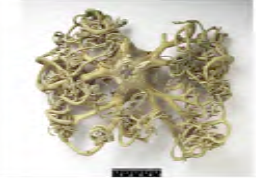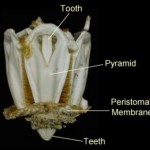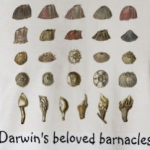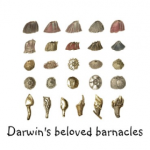←Previous Lesson: Early Paradigms and Exploration
Edward Forbes spent his life championing a hypothesis whose evidence was flawed and extrapolations unjustified. The idea of a lifeless deep-sea held sway in a society mystified by the unknown and afraid of what it would hold. Forbes was the scientist-manifestation of this fear and never would concede the Azoic Hypothesis, even in the face of historical and tangible evidence. He was not the villain or the Benedict Arnold of deep-sea biology, but more like the conflicted tragic who could not achieve the historical greatness he so much desired. As Tony Koslow describes in The Silent Deep (1): “Forbes stands in the history of science as one of those enigmatic figures who, through an excess of antiquated intellectual baggage, comes close yet fails to grasp greatness.”
The evidence for life in the depths of the sea was firmly established by the early part of the 19th century, nearly 40 years before Forbes would set sail and drop dredge in the Aegean Sea. Many of the reports were coming in from naval officers and ship captains, not scientists. These reports were either not well-known or were not valued as rigorous evidence among the scientific circles. Indeed, these two issues are as pervasive today and they were nearly 200 years ago. Many modern marine scientists are unaware of government reports or choose to ignore their findings as they have not been vetted in the manner appropriate for scientific rigor.

Some of the earliest observations of the British Arctic exploration expedition commanded by Captain John Ross in 1818 aboard HMS Isabella and Alexander. While exploring the northwestern Atlantic for a fabled Northwest Passage under the charge of the Royal Admiralty, he was instructed to collect specimens along the way. His dredges routinely made fall between 850 and 2000 meters depths and contained many crustaceans, corals, worms and other fauna that we would today consider typical deep Atlantic species like the Medusa’s Head basket star (left). Captain John Ross’ nephew, Sir James Clark Ross, wrote 20 years later,
“Although contrary to the general belief of naturalists, I have no doubt that from however great a depth we may be enabled to bring up the mud and stones of the bed of the ocean, we shall find them teaming with animal life; the extreme pressure at the greatest depth does not appear to affect these creatures…”
Ironically, though neither Ross published their results in scientific papers, Forbes did examine the collections of James Clark Ross.
Expeditions were continuing to report a vibrant expanse of life in the Northern Atlantic even after Forbes wrote his account on the fauna of the Aegean Sea and proposed the Azoic Hypothesis (2). From 1850 and into the 1860s, Norwegian marine biologist Michael Sars was routinely discovering an enormous variety of new sea life between 300-800 meters. These findings though were criticized by not being deep enough to disprove the Azoic Hypothesis. In 1860, sailing aboard the HMS Bulldog, G.C. Wallich recovered 13 brittle stars from a sounding line reaching over 2300 meters. Fascinated by these findings, Charles Darwin wrote to Wallich,
“What a wonderful fact about the Ophiurae, & what a capitol proof of the Foraminerifera having been alive in their stomachs […]
P.S. Is it not a most curious fact that the Water at such pround depths, & under such a vast pressure, should retain Oxygen for the respiration of the animals mentioned by you?”
Forbes passed away in 1852 at the very young age of 39 just days after the onset of an illness. While he wasn’t around to witness the results pour in from Sars’ and Wallich’s expeditions, there was opportunity to revise his ideas based on the collections, reports and notes of both Ross expeditions. But it should be noted that Forbes was not only a marine biologist. He made significant research advance on land molluscs, botany, geology and paleontology. He was on the quick rise up, being elected to the President’s Chair of the Geological Society just a year before his death, and well-liked and respected among colleagues. Prominent scientist Thomas H. Huxley wrote of his impact in a lengthy obituary,
“It is not because he was so gifted that the veterans of science one and all affirm his loss to be irreparable; and the aspirants know that they may succeed, but cannot replace him. Our affections cling to character and not to intellect; and rare as was the genius of Edward Forbes, his character was rarer still. The petty vanities and heart-burnings which are the besetting sins of men of science and of men of letters, had no hold upon his large and generous nature–he did not even understand them in others.”
Many scientists make mistakes in their career and are cautious to admit any error on their parts. His folly was not a setback to the science at the time, in my opinion because it set up a null hypothesis that can easily be tested. One person’s legacy should not be constrained by a single event when there was no harm done. Given what Huxley and others appear to think of Edward Forbes, had he lived long enough he may very well have re-evaluated his position. But the greater lesson I think we can learn, one still relevant today, is to not ignore evidence, opinions and observations from non-traditional sources. Scientists frequently turn a smug nose to those outside of their circles (even to other scientists with expertise in other areas). But scientists time and again can gain valuable insight by merely listening to the people, and acknowledging the world, around them. That is, in essence, how science proceeds.
References:
Share the post "Deep Sea 101: Forbes’ Folly – Evidence of Deep Sea Life Ignored"






I discussed Forbes and his ideas on geographical distributions (continental extensions) in my paper on Darwin’s seed experiments. Hooker sympathized with Forbes in his debate with Darwin over transoceanic dispersal, maintaining a large southern continent that since sunk to explain distributions.
And just to note, Forbes was born on February 12, 1815, exactly 6 years after Darwin. Maybe a conference should be in the works for his bicentennial?
One of my few vintage texts (OK, my ONLY vintage text) is an original of Forbes’ Echondermata of the British Territories. I should look in it for signs of his folly
Good piece and I agree with your conclusion. With regard to comments about scientists, you could easily have just replaced the word “scientist” with “people” …would still hold true ;)
Those so eager to deprecate poor Forbes ought to investigate the erudition with which he produced such exemplary volumes and in so great detail. For some reason the modern critic seeks to entirely discredit so great a man.
Consider what Darwin said of Edward Forbes in the now hallowed precincts of his own The Origin of Species. Google it.
Darwin, despite a disagreement with the idea of ‘polarity’, regarded Forbes highly-often referring to his work to support his own arguments. Darwin remembered Forbes in the precincts of his work The Origin of Species:
“As the late Edward Forbes often insisted, there is a striking parallelism in the laws of life throughout time and space; the laws governing the succession of forms in past times being nearly the same with those governing at the present time the differences in different areas. We see this in many facts.” Origin of Species chap. 13
Darwin’s quest was ‘the laws of life’ and it is interesting that he remembered Forbes for a ‘striking parallelism in the laws of life throughout time and space’-quite a high accolade.
Forbes’ active and productive career fell within a forty year span preceding Darwin’s publication of Origin of Species in 1859. Forbes died in 1854 and the book which he contemplated, The Natural History of the European Seas, to which he would contribute 112 precious pages, was completed by a colleague and published in 1859.